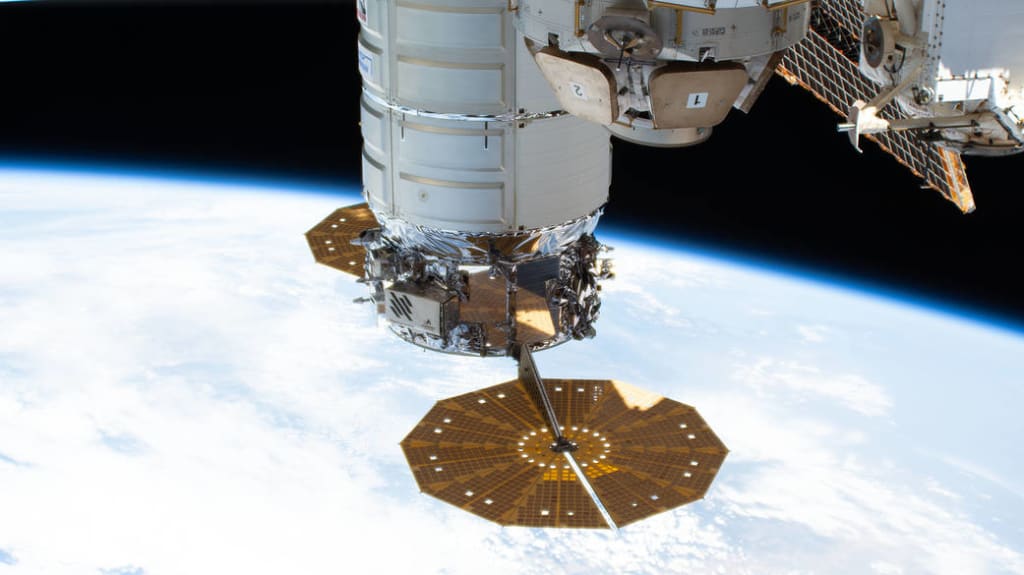A time for empathy?

Nobody can hear a scream in the vacuum of space, or so they say. But we all know that this is not true, at least for one ship’s final mission.
Everyone was in high spirits because they were on their way home. Okay, it would take another nine months or so to get there and with plenty of work to be done before they arrived, but they were going in the right direction. They were at least inbound and no longer headed out into the heavens. After tours of duty that ranged from three years to nine, all on board were ready for some rest and recuperation back on Earth. All, that is, apart from Mrs Tibbins, the ship’s cat, who was perfectly at home resting and relaxing in the lap of any one of the crew.
Deep Space Transport Vessel (DSTV) Endurance was a happy ship, had been since the day it first commissioned in Lunar orbit in 2079, 28 years ago. Since then, it had journeyed between Earth, Luna, Mars and the Asteroid Main Belt, according to the needs of its commissioned flight plan, the whims of its clients, and the position of the planets, moons and asteroids. Whether for supplies, to return extracted celestial resources such as rare metals back to cislunar orbit or, for that matter, the returning to their homes and loved ones of those long-range travelers who had come to the end of their off-world missions. It was a multi-purpose transport vessel and every trip it made was carefully planned so that no part of any journey was ever wasted.
A science team headed out to Mars Base Elysium doubled as ship’s flight crew or engineers. Each of the team members was given a range of scientific studies to complete. This not only kept their minds active, it also helped to pay for their transit. Food and other supplies picked up from Earth were grown enroute. Mycoproteins were prepared in specially built vessels, insect ‘livestock’ reared and reproduced, even some fruit and vegetables were propagated from seeds sent out with the Earth supplies and grown during the long outward journeys in the multiple hydroponic gardens of DSTS Endurance. The resulting produce could be frozen, dried, or otherwise preserved and packaged up, ready to be landed on Mars or fired off on a probe destined for a commercial mining operation somewhere out in the unfathomable expanse of the Main Belt.
Everyone on board was assigned a list of duties for each day. It might include anything from monitoring communications to weeding salad trays, repairing equipment to cleaning out the latrines, taking a space walk to cooking a meal. Even ‘passengers’ – the ubiquitous billionaires booking vacations to the stars – had to earn their passage and take on their fair share of chores. It was considered no hardship and the artificial intelligence rostering system prevented arguments. Any complaints to the faceless app that had given you a typically tedious task was met with a bland ‘feedback noted’ until you gave up trying to complain. Over the 28 years of the mission, this approach to getting things done had engendered a feeling that everyone was in it together. There were no leaders or followers. Everybody did their bit according to the highly organized rostering system. Complaining about it was ineffective, considered bad form and mostly ignored.
One of the byproducts of this egalitarian form of labor organization was that there evolved a strong feeling of community in the isolation of space. It had become almost a joke, with everyone claiming to share everyone else’s feelings. This collective empathy was first noticed some six months into an outward-bound journey, the crew having well and truly bonded into an efficient working operation. It was Joey’s turn to cook the communal meal, and everyone was relaxing in the rest and recuperation module – ‘El Cantina’ as it was affectionally known. Joey was chopping some greens with his favorite chef’s knife when he caught his finger and gave a high-pitched yelp. Everyone else jumped or looked up to see what the matter was.
“What’s up, Joey?” asked Curtis.
“Owwwweee! I musta cut half my finger off!” Joey whined!
“Throw it in the pasta sauce,” said Curtis, unsympathetically. We can’t afford to waste any protein, remember?” Several around the module laughed, but not Lee.
“Ahhh! I felt that!” she said, clutching her own finger.”
“Yeah, me too!” said Yuri, smirking.
“No really, I can still feel it. Can almost see the blood.” Everyone took it to be a part of the empathy joke, but the phenomenon continued, at first dismissed as ‘one of those crazy things that happens in space,’ before everyone began to notice the strange effect of these shared emotional experiences.
If a crew member was feeling tired while undertaking a particularly arduous rostered task, one of the others would offer to take over… without even being asked. The expression “I can feel your pain,” took on a particularly literal meaning. It got to the point where, whenever a person pinched their finger with a hand tool or stubbed a toe on an obstruction, several others would yell out as one. It wasn’t just physical pain either.
“Oh no!” one would say to another. “Is it bad news?” Without being told of a crewmate’s bereavement. Each of the others could feel the grief as if it were their own. Even when there was a crew changeover, as there was when they were able to stop off in Mars orbit or at a Main Belt rendezvous. The new team members would board and find themselves instantly integrated into the shared emotions of the community. It was a regular home from home atmosphere and one in which they shared a common bond as if they were all emotional clones. It wasn’t long before any newcomer started to feel the communal empathy. Someone even dubbed the ship’s emotional environment as the ‘Endurance Empathy Zone’ – the Eee-Eee-Zee. It got to the point where they felt they had to report the phenomenon to Flight Control back on Earth. This, despite the fact that, for the most part, their mission was organized independently of any ground control, other than the planning of the routes, the stop-offs, the cargo manifest and passenger, supply and resource retrieval transport itinerary. In reply, the mission directors simply said that they should monitor developments and report anything new or unusual. What could be more unusual that a crew that had a single, all-pervading, shared emotional makeup?
* * * * *
The final part of the mission’s return journey involved a long-transit crew who were awake for most of the mission. The others were ‘sleepers’, placed in stasis so that they used up less food, water and oxygen, and didn’t go crazy from the boredom and isolation. When it came time to wake these resting members of the crew, so it was deemed a good time to have a pre-return celebration.
“I put the fizz in the ice box,” said Deek “And we can order a takeout.” Everyone smiled as each had reached the same decision pretty much at the same time. A ‘takeout’ was a choice from a huge menu from around the Terran continents, prepared to order and delivered from the cryo-store, plated up, ready to eat. No human hand had touched the food, it was prepared entirely by the gastro-emulation system. Although they mostly ate communal meals cooked by one of the volunteer chefs, a takeout was an extra special treat.
Of course, nobody needed to ask what everyone else was eating because they could each taste the others’ meals. It made for an unusually eclectic dining experience. “I’m liking your Enchiladas, Jean-Pierre,” said Helen with a grin. “Though not sure if they go with my Sashimi.” The celebrations were a great success with everyone relaxing and getting into the party spirit. Conversation was lively and eventually moved on to the subject of favorite movies, with the golden era of 20th Century entertainment being the main thread of the conversation. All were keen to participate in the debate. All, that is, except for Mrs Tibbins, who was content to curl up on her favorite chair, half purring, half snoring, in her blissful feline dreams.
“Which of the classic era of celluloid entertainment do you rate the highest?” asked Andromeda. “Seven Samurai? Wizard of Oz? Casablanca? Blade Runner?”
“What about a space film?” asked Alex.
“What do you mean, ‘what about a space film?’ What’s Blade Runner, if not a space film?”
“Blade Runner was set on Earth, 21st century. The androids just came down from space and found the mother planet in a glorious climate fuck-up.”
“Well, how about Star Wars, then?”
“Star Wars? Star Wars? That was more of a western than a space film. As was Seven Samurai. Cummon guys, you gotta do better than that.”
“Alien”
“What?”
“Alien!” repeated Andromeda
“Was that even a movie?”
“Sure it was,” she said “It was a movie. A movie about a deadly alien that wreaks havoc on board a cargo vessel. Just like the Endurance.”
“I don’t remember no movie Alien.”
“Sure you do. Where the critter bursts out of the astronaut’s stomach. After dinner. Pretty much the set up here, right?”
At that they all laughed. All feeling, simultaneously, a combination of fear and its defensive antithesis – raucous humor – at the horrific scenario that reflected their own situation.
“Well, I never seen ‘Alien,’ said Deek, “So I think I am going to go to my pod now to watch it.” Of course, the film had been remastered and enhanced considerably since it was released in the 20th century as a simple, two-dimensional, no smell, no taste, no enhanced environmental engagement technology product of the kind that characterized latter day multiple sensory entertainment.
So it was that Deek said a warm good night to the assembled company and retired to his pod, his sleeping and personal cabin, to watch a space horror film from a past century. The others remained in El Cantina, laughing, joking, drinking, and continuing to graze on the remaining food stuffs. After about an hour, the conversation began to quieten. One by one the assembled company began to look toward the sleeping quarters, staring in silence, the lack of sound deathly in its emptiness. One by one they began to stare, eyes wide, and perspire, pulses racing, hairs stood on end, breathing shallow and rapid. As if as one, they all looked in the direction of Deek’s pod, seeing together the same vision of hell in space. All, as if one, let out the most terrible, blood curdling, deathly scream. As they watched in horror, with their collective mind’s eye, they could see nothing of Deek, or his private sleeping module. They could see nothing but a great pink and grey slimy spatter on the pod’s windows and door.
All were frozen where they stood or sat. All, that is, except Mrs Tibbins, who leapt right up to the top of the bulkhead and then ran off into the quietest, darkest corner of the module.
* * * * *
© Raymond G. Taylor, 2020 all rights reserved. The author has asserted his right to be identified as the author of this work.
https://www.facebook.com/Raymond.G.Taylor.author/
About the Creator
Raymond G. Taylor
Author based in Kent, England. A writer of fictional short stories in a wide range of genres, he has been a non-fiction writer since the 1980s. Non-fiction subjects include art, history, technology, business, law, and the human condition.
Enjoyed the story? Support the Creator.
Subscribe for free to receive all their stories in your feed. You could also pledge your support or give them a one-off tip, letting them know you appreciate their work.






Comments (1)
Homespun "Alien" menace. Anyone up for "Predator"?